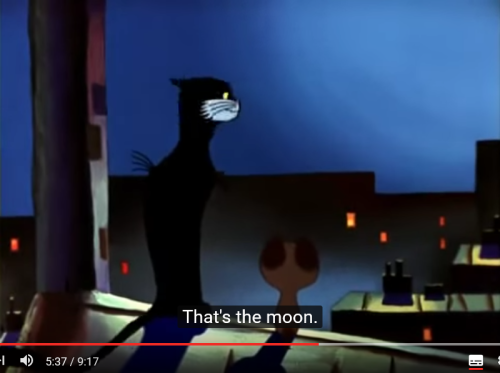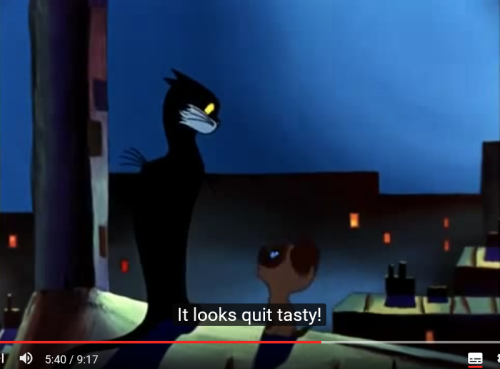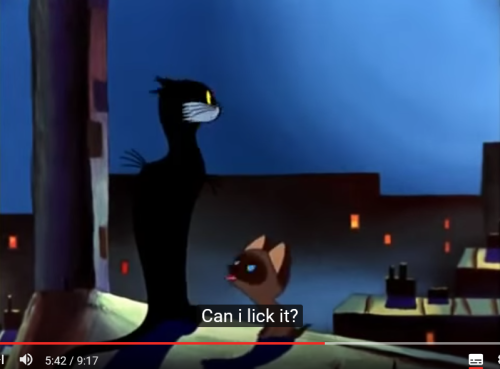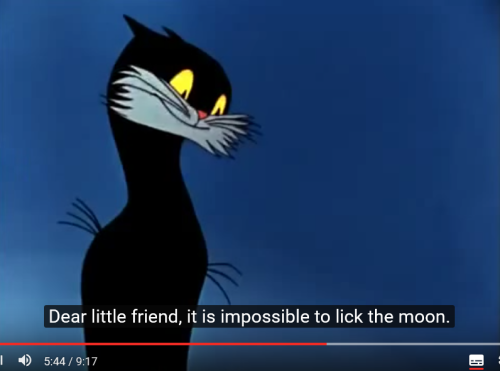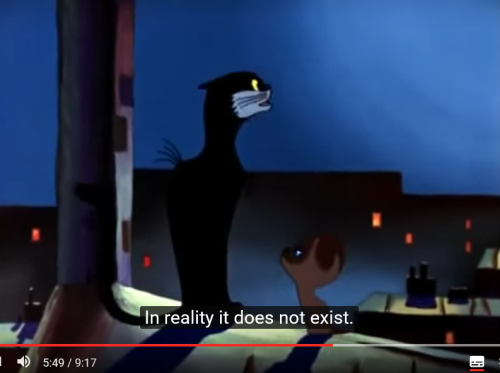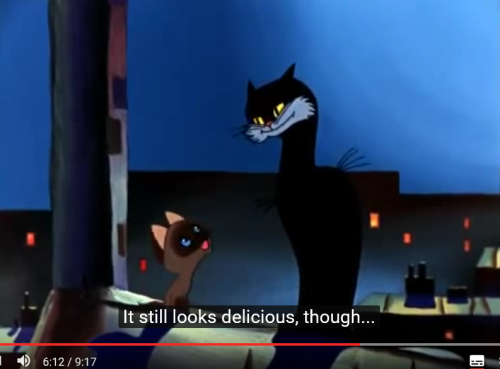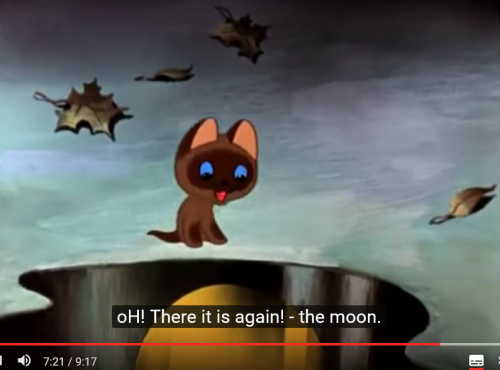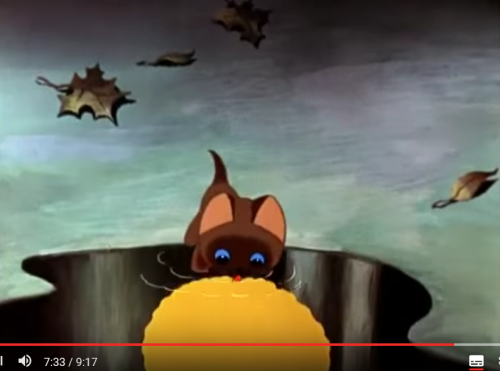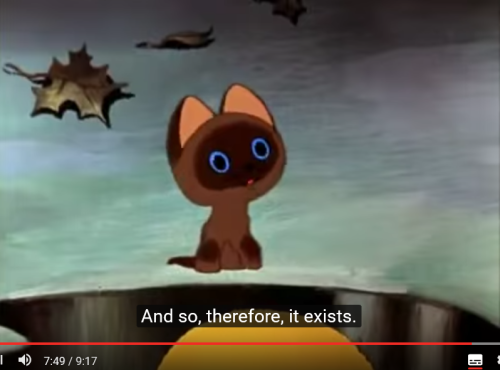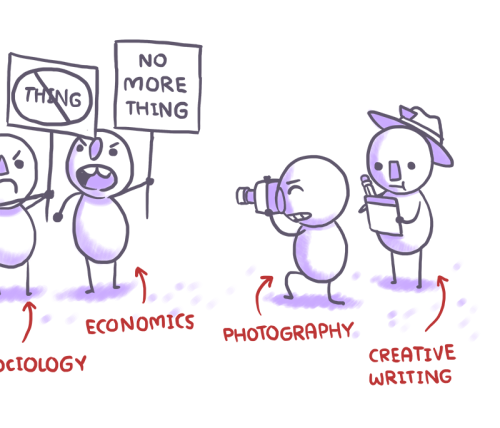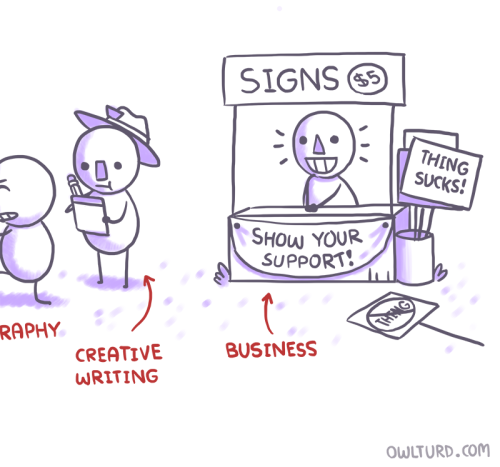Glyn Webster
Shared posts
Saturday Morning Breakfast Cereal - The Test
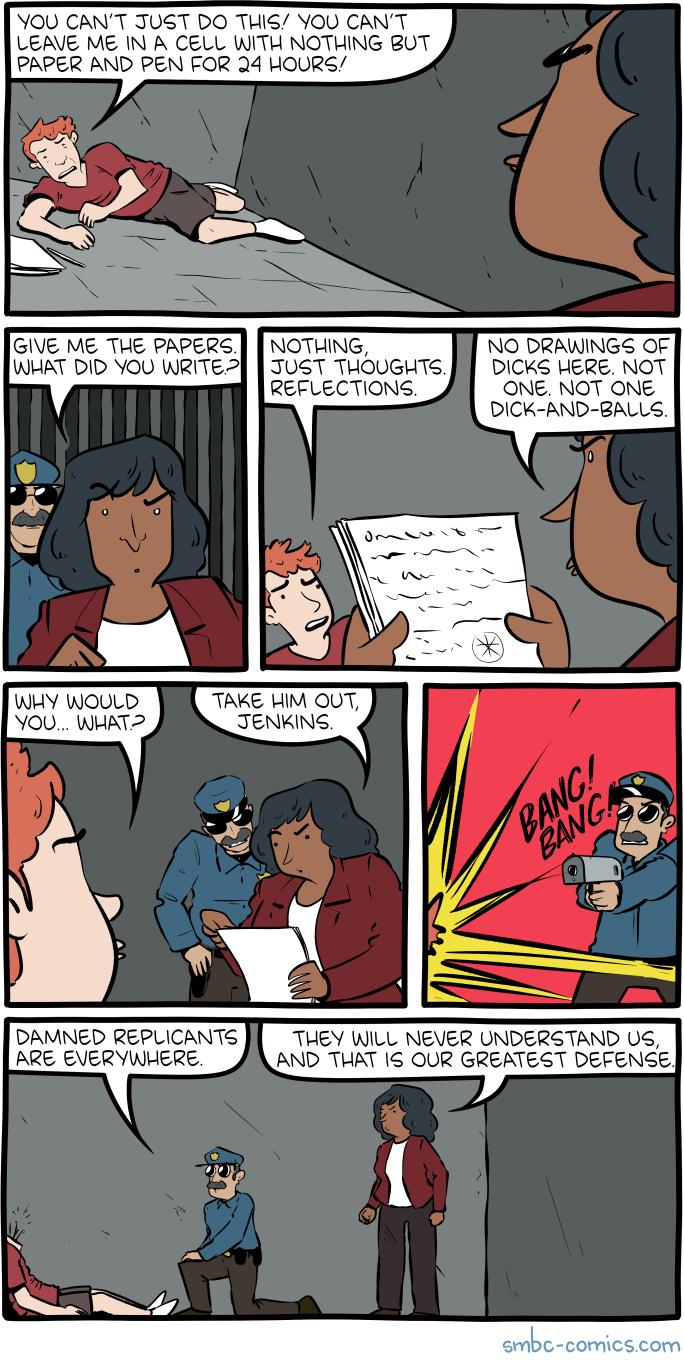
Click here to go see the bonus panel!
Hovertext:
Look it's the only test with no false negatives.
Today's News:
rothmarko: ry-la: @wuph This is from a Russian cartoon called...
Easy Come …
The Ironman Heavymetalweight wrestling championship operates under 24/7 rules, meaning that the titleholder must defend it at all times against all comers. This has bred some chaos, with the belt changing hands more than 1,170 times. English wrestler Laura James won the belt in June and lost it the same day to her cat, Bunny (above). Other notable winners:
- a monkey
- a miniature Dachshund
- a Hello Kitty doll
- a baseball bat
- three different ladders
- a chicken doll
- a poster
- a ringside mat
- a pint of beer
- a steel chair
- two inflatable love dolls
- Vince McMahon’s star on the Hollywood Walk of Fame
- an “invisible wrestler”
- three elementary school girls
- the entire audience of Beyond Wrestling’s Americanrana ’16
Heroically, the belt itself became the 1,000th champion. Sanshiro Takagi, the 999th titleholder, was attempting to retire when Poison Sawada knocked him out with the belt, which fell on his chest, “pinning” him. The referee counted him out.
carlburton: Pre-Release Steam page for my new game ISLANDS is...
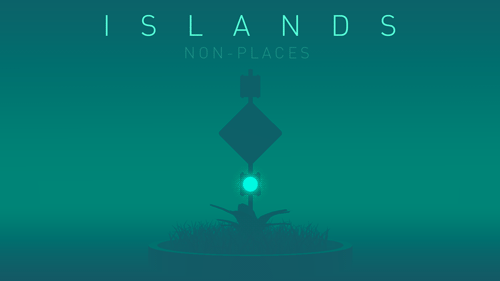



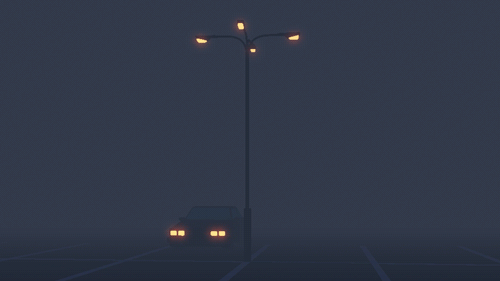



Pre-Release Steam page for my new game ISLANDS is now live! Wishlist-able.
Nov 2016
Platforms: Mac / PC / iOS
Adventures in Science Fiction Cover Art: The Futuristic Cities of Lima de Freitas, Part I
(Cover for the 1967 edition of vol. 1 of The Moon is a Harsh Mistress (1965), Robert A. Heinlein)
The Portuguese painter and illustrator Lima de Freitas (1927-1998) created a vast number of covers for the Portuguese press Livros do Brasil. For more on the range of art he produced in his career consult his wikipedia page [here].
A while back I reviewed Mordecai Roshwald’s Level 7 (1959) and discovered de Freitas’ amazing cover (below). More than any of the US editions, it evokes the claustrophobic tone of the novel (and even some of the surreal elements).
As the son of two architects, architecturally inclined SF covers always fascinate. Thus, as an introduction to his art (if you do not know it already) I have collected a handful of his cityscapes. They are surreal masterpieces. Lima de Freitas’ covers emphasize the city as a canvas, the textures of human occupation–for example, the 1964 edition of Edmund Cooper’s Seed of Light (1959) (my review).
For a catalogue (in Portuguese) of Livros do Brasil‘s SF novels (published under the Argonauta imprint) consult this encyclopedic site Colecção Argonauta. Even if you cannot read Portuguese (me!), browsing the images will be well worth your time.
A new favorite SF artist….
It is fascinating seeing non-English language covers for some of the great classics of the SF genre—Asimov, Heinlein, Simak, etc. Although, you couldn’t pay me to reread Heinlein’s agonizingly awful Farnham’s Freehold (1964). Also, Livros do Brasil published quite a few French SF authors in translation–Stefan Wul, Paul Frenchm Pierre Versins, etc)–which remain (mostly) unavailable for English readers.
As always, what are your favorites? Why? Has anyone read novels/short fiction by the French SF authors below?
Enjoy!
For more Adventures in SF art posts consult the INDEX

(Cover for the 1959 edition of Lucky Starr and the Oceans of Venus (1954), Isaac Asimov)
(Cover for the 1964 edition of Seed of Light (1959), Edmund Cooper)
(Cover for the 1967 edition of City (1952), Clifford D. Simak)
(Cover for the 1959 edition of Retour à “O” (1956), Stefan Wul)
(Cover for the 1956 edition of Lucky Starr and the Pirates of the Asteroids (1953), Isaac Asimov)
(1957 edition of The Syndic (1953), C. M. Kornbluth)
(Cover for the 1966 edition of The Drowned World (1962), J. G. Ballard)
(Cover for the 1964 edition of Foundation and Empire (1952), Isaac Asimov)
(Cover for the 1967 edition of vol. 2 of Farnham’s Freehold (1964), Robert A. Heinlein) 
(Cover for the 1958 edition of I Am Legend (1954), Richard A. Matheson)
(Cover for the 1963 edition of Level 7 (1959), Mordecai Roshwald) 
(Cover for the 1963 edition of La peur géante (1957), Stefan Wul)
(Cover for the 1958 edition of Wine of the Dreamers (1951), John D. MacDonald)
(Cover for the 1957 edition of En avant, Mars! (1955), Pierre Versins)
 (Cover for the 1964 edition of Le satellite sombre (1962), Jacques Vallée)
(Cover for the 1964 edition of Le satellite sombre (1962), Jacques Vallée)
(Cover for the 1964 edition of Le signe du chien (1960), Jean Hougron)
Filed under: Science Fiction cover art Tagged: 1950s, 1960s, apocalyptic, art, avant-garde, book reviews, C. M. Kornbluth, Clifford D. Simak, experimental, Isaac Asimov, J. G. Ballard, Lima de Freitas, Mordecai Roshwald, paperbacks, Paul French, Pierre Versins, post-apocalyptic, pulp, Richard Matheson, Robert A. Heinlein, sci-fi, science fiction, space opera, spaceships, Stefan Wul, technology
dngrs: The earliest known surviving pair of socks, created...


The earliest known surviving pair of socks, created by naalbinding. Dating from 300-500, these were excavated from Oxyrhynchus on the Nile in Egypt. The split toes were designed for use with sandals. On display in the Victoria & Albert museum.
Sock
A sock is an item of clothing worn on the feet and often covering the ankle and some part of the calf. Some type of shoe or boot is typically worn over socks. In ancient times, socks were made from leather or matted animal hair. In the late 16th century, machine-knit socks were first produced.
Nålebinding
Nålebinding (Danish: literally “binding with a needle” or “needle-binding”, also naalbinding, nålbinding, nålbindning or naalebinding) is a fabric creation technique predating both knitting and crochet.
*I didn’t know that Roman Egypt had so many German tourists
Towards a taxonomy of cliches in Space Opera
So I'm chewing over the idea of eventually returning to writing far future SF-in-spaaaace, because that's what my editors tell me is hot right now (subtext: "Charlie, won't you write us a space opera?"). A secondary requirement is that it has to be all new—no sequels to earlier work need apply. But I have a headache, because the new space opera turns 30 this year, with the anniversary of the publication of "Consider Phlebas" (or maybe "Schismatrix")—or even 40 (with the anniversary of the original "Star Wars"). There's a lot of prior art, much of it not very good, and the field has accumulated a huge and hoary body of cliches.
Some of you might remember the Evil Overlord's List, a list of all the generic cliche mistakes that Evil Overlords tend to make in fiction (16: I will never utter the sentence "But before I kill you, there's just one thing I want to know."). I think that it might be a good idea to begin bolting together a similar list of the cliches to which Space Opera is prone, purely as an exercise in making sure that once I get under way I only make new and original mistakes, rather than recycling the same-old same-old.
This is not an exhaustive list—it's merely a start, the tip of a very large iceberg glimpsed on the horizon. And note that I'm specifically excluding the big media franchise products—Star Wars, Star Trek, Firefly, and similar—from consideration: any one of them could provide a huge cliche list in its own right, but I'm interested in the substance of the literary genre rather than in what TV and film have built using the borrowed furniture of the field.
List follows, below the cut.
-
Planetary civilizations
This subheading covers common cliches/mistakes made in discussing inhabited (Earthlike) planets and the people who live on them.
- Planets are small and easily explored
- All the land masses on a planet are easily accessible
- You can fly anywhere on a planet in a short time without leaving the atmosphere
- You can fly anywhere at Mach 2.2+ without experiencing hull heating due to atmospheric friction
- You can fly anywhere at Mach 2.2+ without worrying about Air Traffic Control and NOTAMs
- Everywhere on a planet shares a common climate and the same weather patterns
- The same plants and animals can be found everywhere on a given planet
- Coriolis force, trade winds, cyclones, what are those?
- Oceans are small, land-locked, and mainly useful for fishing
- Plate tectonics is easily ignored, unless the plot requires a Volcano/Earthquake
- Deep carbon cycle, subduction, ionosphere UV splitting of water, long-term terraforming stability: why worry about little things like that?
- Ice ages are inevitably global
- Some planets have a breathable atmosphere but no water
-
Space and cosmology
Common blunders in cosmology, planetography, orbital mechanics, and related.
- Moons are good, the more the better!
- Suns are good, too, the more the better!
- ... Especially if one of them is a giant. (Those never explode or flare messily.)
- Planetary ring systems are picturesque, not dangerous
- Planets have a diurnal period precisely 86,400 Earth seconds long
- Planets rotate east-to-west
- Planets have magnetic poles that approximate their rotational axis
- Planetary gravity can be approximated to a point source for purposes of calculating orbital dynamics
- All satellites orbit the equator
- You can change orbital inclination easily
- Stuff in orbit doesn't change orbital inclination spontaneously
- Geosynchronous orbit is easy to get to
- If you are in geosynchronous orbit away from the equator you still hover over the same spot on the planetary surface all the time
- Planets are close together
- Concentric planets orbit the same distance apart
- The flight time between planets in an inner star system is the same as between planets in the outer system
- Asteroids are so close together that you can hide between them
- ... but they never clump into planets
- Asteroidal dust makes an irritating ping as it bounces off a ship's hull
- ... for some reason you never run into it at multiple km/sec
- Actually, hitting a space rock or other spaceship is no big deal, a bit like being in a minor car accident
- ... Even though the kinetic energy released by an impact increases with the square of the velocity, and you're travelling hundreds to millions of time faster
- Gas giants are good for mining volatiles
- ... Because dealing with Mach 6 wind shear, 10,000 Bar pressure, and a lethally deep gravity well is trivial
- ... Because we need volatiles such as 3He, to fuel our aneutronic fusion reactors (hint: Boron is cheaper and much less scarce)
- All comets have tails
- ... they're sort of hairless and scaly, like a [sarcasm limit exceeded - Ed.]
- Rocky planets are either airless or shirt-sleeves worlds with breathable air
- Pay no attention to Venus, runaway greenhouse worlds are imaginary
- Big stars are as long-lived and likely to have planets as dwarf stars
- Supernovae happen routinely and are no big deal
- Interstellar space is totally empty
- ... You can fly as fast as you like without worrying about dust particles
- You don't have to worry about interstellar gas, either
- ... Except when there's not enough of it to keep your ramscoop accelerating
- Incidentally? Ramscoops totally work! (Larry Niven said so in 1968.)
- You can go fast enough to experience relativistic time dilation without worrying about the pesky cosmic background radiation blue-shifting into hard X-rays and frying you
- You can forget all about hitting the occasional interstellar 4He nucleus with some multiple of the energy of an alpha particle, several million times a second
- ... Don't worry about hitting the electrons bound to the neutral hydrogen either, gamma photons totally aren't a thing
- You can use handy black holes and neutron stars to make handbrake turns in space
- You an also use gas giants to make handbrake turns, at high relativistic speeds
- Don't let the fact the space is full of exciting high energy physics put you off going there, squishy meatsack-persons!
-
Biology
Biology is complicated—so much so that many SF authors suffer from Dunning-Kruger syndrome in approaching the design of life-supporting planets.
- All planets harbour a single apex predator that eats people
- All planets harbour is a single venomous insect/reptile analog that poisons people
- The native flora and fauna use a biochemistry that we can derive sustenance from
- ... This includes weird-ass micronutrients
- Pay no attention to the native microbiota, they're harmless
- ... You won't even suffer from hay fever! Much less systemic anaphylaxis.
- Ecosystems are robust; why not let your ship's cat stretch her legs whenever you land?
- ... This goes for your ship's rats, too
- Planets only have one class of plant-analog and one class of animal-analog
- ... Only Earth has reptiles, amphibia, fish, birds, insects, mammals, fungi, etc.
- Terraforming is really simple; you can do it with algae capsules delivered from orbit
- There are no native parasites that might eat Maize, so we can turn the entire largest continent into a robot-run plantation
- ... Soil exhaustion isn't a thing
- ... Terrestrial constraints on agriculture don't apply on other planets
- You can keep a starship crew healthy and sane indefinitely using a life support system running on blue-green algae, tilapia, and maybe the odd soy bean plant
- Life support systems are simple, stable, and self-managing
- It is safe to put bleach down the toilet on a starship; your algae/tilapia/soy will totally deal with it it when it comes out of the recycler
- Vitamins? Naah, we'll just genetically modify the crew to make their own
- If you implant humans with the gene for chlorophyl they can magically become photosynthetic
- ... Okay, if you add the genes for RuBiSCO and the C3 pathway they can magically become photosynthetic
- ... Because of course two square meters of skin is enough surface area to photosynthetically capture enough energy for a high-metabolic-rate mammal to live off
- Humans can too hibernate/deep sleep between star systems! All you need is a cold enough chest freezer
- ... Just as long as their intestinal flora go into cold sleep at the same time
- ... and so do the low metabolic rate arctic pseudofungi spores they picked up at the last planetary stop
-
Economics
Fingernails-on-blackboard time for me. (See also: Neptune's Brood)
- New Colonies may be either agricultural or mining colonies; rarely, resort colonies
- Everyone uses Money to mediate exchanges of value
- Money is always denominated in uniform ratios divisible by 10
- Money is made out of shiny bits of metal, OR pieces of green paper, OR credit stored in a computer network
- There is only one kind of Money on any given planet, or one credit network
- The same kind of Money is accepted everywhere as payment for all debts
- Visitors are always equipped to interface with the planet-wide credit network
- Planetary credit networks are incredibly secure except when the visitor needs to hack into someone else's bank account
- Barter is a sign of primitive people who haven't invented money
- People who rely on Barter are simple, trusting folks (and a bit stupid on the side)
- Inflation? What is this, I don't even ...
- Deflation? What will they think of next?
- Sales tax? What's that?
- Income tax? What's that?
- Import duty? What's ... (rinse, spin, repeat)
- You can get a loan from your friendly bank manager whenever you need one
- Bank loans accrue interest
- If you fail to replay a bank loan you may be arrested and held in debtor's prison
- ... Or sold into slavery
- ... Or your organs can be seized
- ... Because your body is just one of your fungible assets, right?
- ... And harvesting organs for transplant surgery is a universal practice
- People on planets have not heard of Ponzi Schemes
- People on planets have not heard of Credit Default Swaps or the Black-Scholes equation
- If money is made of shiny bits of metal or green paper, banks have vaults where they store lots of money
- Money sitting in a bank vault is worth something
- Visitors to a Colony can print fake currency without fear of consequences
- Visitors to a Colony can leave their money with a bank between infrequent visits without fear of consequences
- Banks are stable, because ...
- ... The planetary government will never let a bank go bust, because ...
- ... The galactic emperor will never let a planetary government go bust, because ...
- Traders on starships land on planets to load and unload cargo
- ... Or they carry their own orbit-to-surface shuttle
- ... Which is as easy and safe to operate as a fork-lift truck
- Cargo is bought and sold in starports
- It is profitable to ship crude break-bulk cargo like timber or foodstuffs between star systems because starships are cheap and easy to repair and operate
- Break-bulk shipping in open cargo holds has never been improved upon
- Multimodal freight containers, EDI/EDIFACT standards for commerce, bar codes, bourses, and RFID technologies are just inferior and unnecessarily complicated alternatives to a bazaar or indoor market
- Insurance underwriting? Arbitrage? What's that? (rinse, spin, repeat)
- All cargo starships need plenty of unskilled deck hands to help load and unload cargo
- All cargo starships need gun turrets to fight off swarms of space pirates
- ... Cargo starships with guns can fight off space pirates
- Cargo starship crews can fix battle damage
- ... All it takes is enough duct tape and determination
- ... Because space pirate weapons are as deadly as shotguns, not H-bombs
- ... And starships cost no more to build and operate than a 1920s tramp steamer
- Space pirates will happily open fire on a cargo ship to damage it before boarding
- Space pirates need to board cargo ships in order to steal their cargo
- ... And impress/conscript/enslave their crew
- Piracy is a huge problem for space traders
- You can tell the difference between a pirate and a space trader with a glance
- A cargo captain in a hole might easily turn to smuggling to improve their bottom line
- Navies are a lesser threat to smugglers than random encounters with pirates
- Nobody has ever heard of end-user certificates or bonded cargo
- Nobody ever thinks to ship their high-tax cargo via a free port or use complex financial arrangements to avoid customs duty without having to hire a dodgy armed ship with a poor credit rating
-
Politics
- Planets have a single unitary government (or none at all)
- Planetary governance is no more complex than running a village or small township
- ... This is because the planetary capital is a village or small township, not, say, Beijing or Mexico City
- If there are two or more ethnicities represented on a planet their collective politics are simple and easily understood by analogy to 20th century US race relations
- All planetary natives everywhere speak Galactic Standard English, or Trade Pidgin
- New Colonies can't afford police, detectives, customs inspectors, or the FBI
- New Colonies don't require visting spacers to conform to local dress codes or laws
- New Colonies don't have gun control laws
- New Colonies don't have laws, or if they do they were written by a mad libertarian
- Despite the lack of laws, nobody underage drinks in the saloon
- ... Nobody underage works in the saloon rooms you rent by the hour, either
- ... Nor is there an extensive school truancy problem or much illiteracy
- On reaching pensionable age, all colonists are forced to retire and deported to the Planet of the Pensioners
- There is no unemployment because happy smiley frontier needs cowboys or something
- If the planetary government is a democracy, the new Mayor will be elected by a town meeting
- If the planetary government is an oligarchy, the new Patrician will be elected by a town meeting (of oligarchs, in the back room of the saloon)
- If the planetary government is a theocracy, there will be only one sect of the planetary religion and no awkward long-standing heresies that are too strong/embedded to suppress
- ... And there will be direct rule by Clergy, along the lines of an oligarchy: no Committees of Guardians of the Faith, no separation of executive and legislature, none of the complexity and internal rivalries of Terrestrial theocracies (e.g. Iran, Saudi Arabia)
- If the planet is a colony of the Galactic Empire, the new Planetary Governor will be appointed by the local Sector Governor
- ... It's Governors all the way up (until you hit the Emperor)
- Monarchy is the natural and perfectly ideal form of government
- Only an Imperial Monarchy can ensure the good local governance of a myriad of inhabited planets scattered across the vast reaches of deep space
- Monarchies are never a Single Point Of [Galactic] Failure
- Monarchs are never stupid, mad, ill, or distracted by a secret ambition to be a house painter instead
- Viziers are Always (a) Grand and (b) Evil. (At this point, let's just #include the regular Evil Overlord list, m'kay?)
- Democracies are always corrupt
- You can always bribe your way out of sticky situation if you're from off-world
- All planetary legal systems work the same way (some remix of Common Law, constitutional governance, and trial by jury).
- The standard punishments for a crime range from a small fine, to slavery in the uranium mines for life (about 18 months), to an excruciating death
- Trials are swift and punishments are simple and easy to understand
- Justice is always punitive/retributive/exemplary, never compensatory/preventative/rehabilitative, much less poetic/cryptic/incomprehensible
- ... If the Author disapproves of the death penalty, substitute mind-wipe for the death penalty (like, there's a difference?)
-
Culture
- There is usually only one culture per planet
- ... Sometimes there are two, to provide for an oppositional plot dynamic
- ... Pay no attention to the blank spots on the map
- ... And especially don't go looking for the unmarked mass graves
- Planetary natives are either Colonists or Indigenous
- Indigenous peoples are either Primitive or Advanced (and Decadent)
- Advanced Indigines either don't have space travel or gave it up (see: Decadent)
- Primitive Indigines are either Tribal or Mediaeval
- Mediaeval Indigines invariably recapitulate the politics of the Hundred Years War
- Visits to Mediaeval Indigenous Colonies can be approximated to a side-quest into Fantasyland
- If the planet is a Colony it is either a Lost Colony or a New Colony
- Lost Colonies may resemble Primitive Indigines but never Advanced
- New Colonies resemble Tombstone, AZ, circa 1880
- New Colonists live in log cabins, ride mules/horses and carry ~six-guns~ blasters
- ... You can find logs (cabins, for the construction of) everywhere on planets
- ... They're like abandoned crates in first-person shooters
- Psychologically speaking, everybody is either WEIRD or Primitive
- Primitive (non-WEIRD) people are stupid and unimaginative
- WEIRD people accept and embrace change and innovation; non-WEIRD people reject both
- Colonies are usually modelled on WEIRD 1950s cultural norms
- Colony People come in two genders
- The Women on New Colonies are either:
- ... Barefoot and pregnant in the kitchen (because colonies need babies)
- ... Dungaree-wearing two-fisted starship-engineering-obsessed lesbians desperate to get off-world
- The Men on New Colonies are either:
- ... Manly plaid-shirt-wearing heterosexual farmers breaking sod in the ~west~ new world
- ... Dastardly drunken muggers waiting behind the spaceport saloon for an unwary spacer
- QUILTBAG: huh? Who are those people and why doesn't somebody cure them?
- ... (Alternatively: everybody is QUILTBAG, pale patriarchal heterosexual penis people are extinct)
- Clothing invariably obeys some regional dress code that has been observed on Earth in the past thousand years; in extreme cases 1950s business attire will serve to avoid attracting undue attention
- You can recognize someone's gender on any planet because:
- ... Women wear dresses or skirts with make-up and long hair
- ... Men wear pants (or occasionally suits of armour)
- ... Hijra? Hermaphrodites? Transgender? Asexual? What are those?
- On some planets people go naked, except for body paint
- ... This causes no problems, whether social or practical
- Colony Planets are invariably a Crapsack World that people are desperate to escape from, unless they're the planetary governor or some species of NPC
- The only place worse than a Colony World is Old Earth
- Old Earth is
- ... An over-crowded overpopulated hell-hole
- ... An over-regulated bureaucratic hell-hole
- ... A poverty-stricken backwater and hell-hole
- ... Destroyed
- ... Lost (because everyone in the galaxy somehow forgot the way home)
- ... Mythical (and many people think it never existed)
- ... Somewhere to run away from
- ... (Rarely) Somewhere to run to
- Slavery is
- ... Ubiquitous
- ... No big deal
- ... Illegal but all the bad guys do it
- "the best thing we ever did for them; they're much happier now"
- Humans are free; aliens are slaves
- Humans are slaves; aliens are free
-
Technology - space travel
- Running a nuclear power plant is kid's business; even a drunken college drop-out can be a ship's engineer
- Rocket motors are simple to maintain and operate, too—they never break
- Reaction mass is incredibly dense, cheap, and easy to stash away in a spare corner
- ... It never runs out
- ... It doesn't require special handling procedures
- ... It's never toxic, cryogenic, teratogenic, radioactive, or corrosive
- Oxygen is freely available in space
- You can go as fast as you like if you just accelerate in a straight line
- Spaceships accelerate at right angles to the direction the occupants experience gravity in
- Spaceships are:
- ... bilaterally symmetrical
- ... rugged and able to survive impacts with other objects
- ... easily maintained by semi-skilled labour/shade tree mechanics
- ... about as complex as a 1920s tramp steamer, or maybe a deep-sea fishing trawler
- ... easily piloted
- ... can stop on a dime
- ... available second-hand in good working order from scrapyards
- ... have wings and an undercarriage, like a biplane
- ... You can hear them coming a parsec away
- Generating electricity aboard a spaceship without solar panels is easy
- ... So is getting rid of waste heat
- ... The bigger the spaceship, the easier it gets (because the square-cube law doesn't exist)
- ... The Death Star would totally not melt itself with its waste heat whenever it fired its planet-zapper!
- Faster than light travel is easy
- ... But the jump drive is fuelled by unobtanium
- Causality violation: what's that?
- There are no regulatory frameworks or licensing regimes for starships
- Nobody would ever think to run a starship up to 50% of light-speed and ram a planet
- ... Even if they did that, the effect wouldn't be significantly worse than a 1940s atom bomb
- There's no regulatory framework for shuttlecraft, either
- ... Because nobody has heard of Kessler syndrome
- ... Also, a space shuttle in-falling from low earth orbit totally doesn't arrive at ground level with kinetic energy equal to about ten times it's own mass in TNT, because if it did it would be a field-expedient weapon of mass destruction
- Flying a spaceship is not only easy, it's easier than flying a Cessna
- Spaceship life support systems are simple to maintain and repair and very forgiving
- Spaceships communicate across interplanetary or interstellar distances by radio
- ... Interplanetary radio works instantaneously
- ... Interplanetary radio communications are as easy to operate as tuning your car stereo to a new AM channel
- GPS works in space beyond low earth orbit: who needs navigation skills these days?
-
Technology - Pew! Pew! Pew!
- Radar gives us an instantaneously updated map of everything in a star system
- ... But stealth technology is totally a thing!
- We can't detect spaceships by looking for their infrared emissions against the 2.7 kelvin cosmic background temperature
- Also, spaceships can hide behind planets or asteroids indefinitely without using their engines or knowing the bearing of the enemy they're hiding from
- Laser beams are instantaneous, don't spread or disperse, and can melt anything
- ... Except a force field that somehow refracts/bends/absorbs the confused photons
- Missiles, with a constrained (small) propulsion system, can overhaul a much bigger/less constrained spaceship at great range
- Strategic Arms Limitation Treaties don't bother to count Free Trader Beowulf's point-defense nuclear missile battery for treaty purposes—only naval nukes count
- Gun turrets have to have a glassed-in canopy and a gunner inside or they won't work
- Also, human gunners can totally draw a bead on a hostile pirate ship maneuvering a few light seconds away. Fire control computers, not so much
- Boarding actions have mysteriously made a come-back from the 1850s.
- Guns are still bang-sticks that require a human to point them at a target
- Stun-guns have no unpleasant after-effects
- Bullets are brainless
- You can dodge laser beams
- Fisticuffs are universally considered to be the optimal way to resolve a sincere difference of opinion over complex commercial interactions
- All starships need to carry armed guards, or at least a gun locker full of blasters for the crew when they're visiting a Colony planet
- Knife missiles—who ordered that?
-
Aliens
- Aliens are multicellular organisms with nervous systems and musculoskeletal systems
- Aliens communicate in language
- ... Using noises
- ... Emitted by their mouths
- ... At frequency ranges we can perceive
- Aliens are individuals
- Aliens are eusocial hive organisms
- Spacefaring aliens are conscious
- Aliens are WEIRD people with latex face paint or funny haircuts
- ... Because primates are a universal deterministic outcome of evolution on all worlds
- Wittgenstein was wrong about talking lions. (If they could speak we'd find what they can say fascinating—mostly because we'd be waiting for them to mutter, "I wonder what those bipeds taste like?")
- Aliens build starships sort-of like humans, but with wonky furniture
- Aliens are interested in us (see Wittgenstein above)
- Aliens want to trade with us
- Aliens want to exchange bodily fluids with us (ewww ...)
- Aliens want to induct us into their civilizational-level fraternity/sorority and make contact in order to teach us the house rules
- Alien species only have one dominant culture
- Alien species are noteworthy for their universally applicable stereotypy, utterly unlike us complicated and divergent human beings
- Aliens have a much longer history of spaceflight than humans, but unaccountably failed to stumble upon and domesticate us during the 11th century
- Aliens have religious beliefs because they have the same theory of mind as human beings and attribute intentionality to natural phenomena (see also: Daniel Dennett)
- Alien religion resembles those of a human culture that thrived prior to 1000 CE and is now considered quaintly obsolescent by most humans
- Aliens can't control themselves
- Aliens are unconditionally hostile
- Aliens are robots
- ... Robot-aliens are just like alien-aliens, only more alien, because robots
- Aliens are incomprehensible
- Aliens have no sense of humor
- Aliens have a human sense of humor
- Aliens have been extinct for millions of years, but:
- ... have left treasures behind in their death-trap-riddled tombs
- ... their ephemeral technologies still work flawlessly
- ... If humans trip the burglar alarm, they're coming back—and they'll be mad
- ... they're extinct because they Sublimed
- ... they're extinct because they became Decadent
- ... they're extinct because they suicided
- ... (robot-alien remix): they're extinct because they tripped over the Halting Problem
- ... they're extinct because (insert dodgy social darwinist argument here)
What do you think I'm missing from the list?
magictransistor: Isaac Frost, George Baxter. Muggletonians Two...
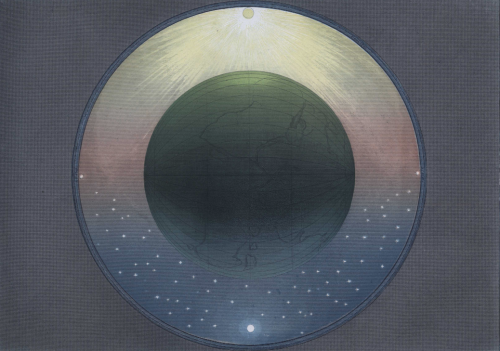
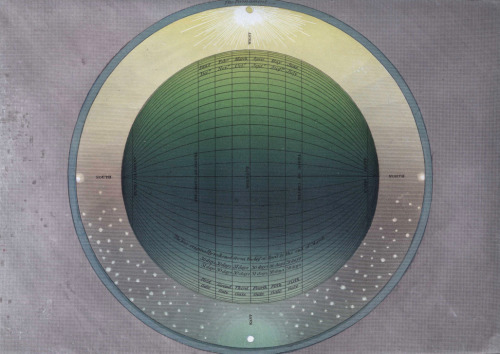
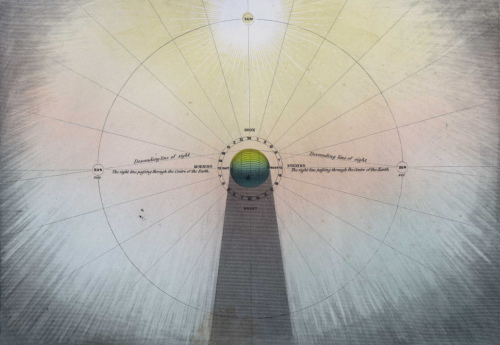
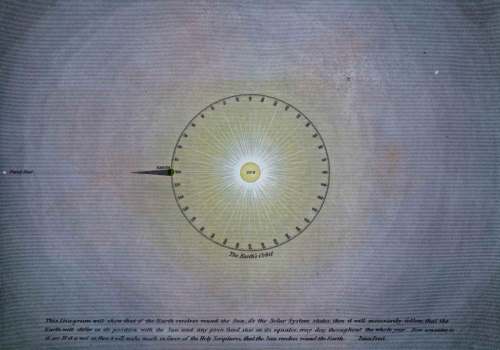
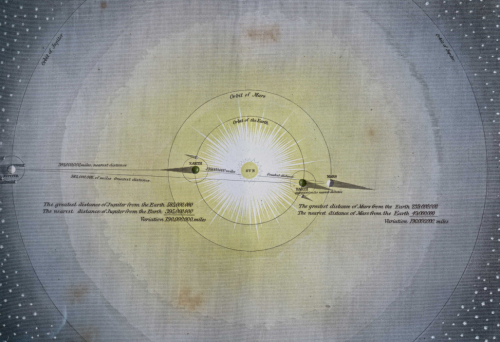
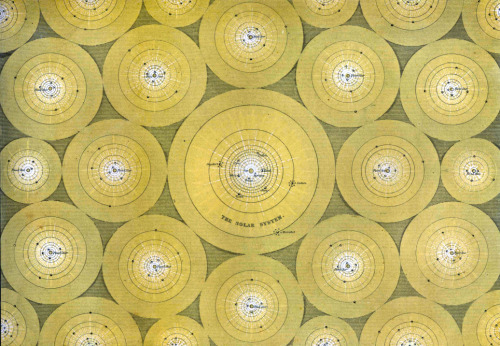
Isaac Frost, George Baxter. Muggletonians Two Systems of Astronomy. 1846.
Isaac Frost was a scientist and prominent member of the Muggletonian sect in the mid 19th Century who was instrumental in the refinement of their astronomical theory, as represented on these prints which he designed. George Baxter was a London printer who developed and patented an unusual method of printing using oil pigments.
This fascinating work outlines the Muggletonians rejection of Newtonian physics. The Prophets had stated that as part of their divine revelation that heaven was only six miles above the earth and that the sun and the moon are not much bigger than they appear to our natural sight. The Muggletonians took a very literal view of biblical statements, and especially statements from the Book of Enoch and demanded that these statements (as interpreted by them) should take precedence over what was claimed to be scientific fact.
As opposed to the Christian view of a Holy Trinity, Muggletonians believed Christ the Son was in fact the true God, while the prophets Elijah and Moses watched over Heaven. In addition, they believed that God paid little attention to His creation, therefore rendering acts of faith and devotion such as prayer, worship, and martyrdom useless. Heaven was to be found on Earth, rather than in the afterlife, and Hell likewise existed within man.
*Never believe that your own historical moment has a hammerlock on nutcase crankiness
2015 in technology: 7 predictions for the year ahead
Super-Colorful Rivers
 "QUANTUM SHOT" #873 "QUANTUM SHOT" #873 Link - article by Avi Abrams You cannot "step into the same river twice", but some rivers are so full of heavenly colour that you are tempted to linger
  (images via)
   (images via) To access the river you will have to fly to La Macarena and then take a horseback trip into the "Serrania de la Macarena" National Park, so it is not that easy to get there - but the rewards of witnessing and even swimming in all this radiant glory speak for themselves. Check out these lovely water-eroded pits in rock where you can even submerge yourself for a brief "fish in a bowl" experience:   There is also an abundance of miniature waterfalls, adding to the spectacular beauty of the place:   (images via) Color it Green: Lovely, Curvaceous River Uvac in Serbia This light-green beauty is located in Special Nature Reserve Uvac, namely the Uvac Canyon, which is also known for being a habitat of huge Griffon Vultures, which can have a wingspan of almost three meters...  (image via) Color it Red: Washed Sand Changes Rivers into "Blood" This is the much-revered Yangtze River in China, which turned color one day (most vividly near Chongqing) due to some washed out sand - and caused an ecological scare in the news as it was initially thought to be caused by somebody dumping chemicals in the river:   (images credit: China Photo Press / Barcroft Media ) Another washed sand "red river" was spotted in Madagascar - this is an aerial shot over the Bombetoka Bay in Betsiboka region:  (image credit: Oledoe) Color it Rainbow: Incredible Volcanic Ash-infused rivers of Iceland Intense volcanic activity in Iceland leads to overall abundance of other-worldly landscapes, and this apparently includes rivers which look like they were lifted bodily from the surface of some other planet - an ancient Mars, perhaps, bountiful with water reflected over the shimmering alien sand. Russian photographer Andrei Ermolayev took these fantastic aerial shots over the Southern coast of Iceland:    (images credit: Andrei Ermolayev) These incredible river-made patterns don't even seem natural, but rather a handiwork of a fairy-tale maiden, an ornament to adorn the blushing face of the Earth, to cherish for ages to come:  (image credit: Andrei Ermolayev) Article by Avi Abrams, Dark Roasted Blend. ALSO READ: "MOTHER NATURE AS AN ABSTRACT ARTIST" -> CONTINUE TO THE "AWESOME NATURE" SERIES ->
|
632 - Fibonacci in Budapest
Read More
The Ulysses Contract
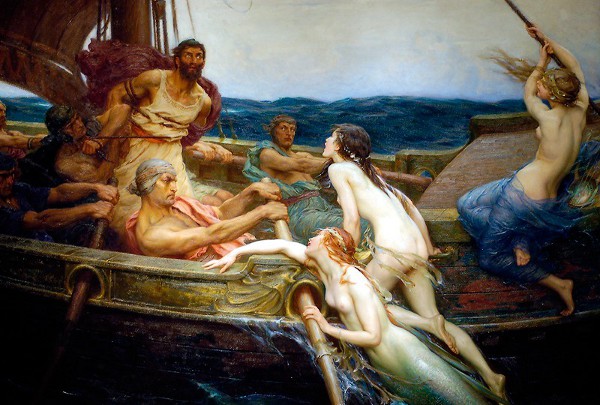
In 1982, 24-year-old schizophrenic patient J.S. faced a difficult decision: The neuroleptic drug Prolixin relieved his psychotic symptoms, but it produced tardive dyskinesia, a progressive disorder that caused uncontrollable movements of his legs, arms, and tongue.
His therapist learned of an experimental program that might reduce this side effect, and J.S. signed consent forms to enter treatment. But the first step was to stop all medications, and without the Prolixin he descended again into psychosis and refused the experimental medication.
This produces an impossible dilemma: Does J.S.’ “sane” self have the right to overrule his “insane” self, if the two disagree? Can Dr. Jekyll bind Mr. Hyde? Such a directive is sometimes called a Ulysses contract, after the Greek hero who ordered his men to disregard his commands as they sailed past the sirens. If a patient directs his caregivers to ignore his own future requests, can the caregivers follow these orders?
In J.S.’ case, the answer was no. The research unit’s legal counsel decided that his earlier consent did not override his later refusal, and he was withdrawn from the program. When he resumed his antipsychotic medication and learned what had happened, he begged for another chance to try the experimental medication. Had they been wrong to refuse him?
(Morton E. Winston, Sally M. Winston, Paul S. Appelbaum, and Nancy K. Rhoden, “Can a Subject Consent to a ‘Ulysses Contract’?”, The Hastings Center Report, 12:4 [August 1982], 26-28)
Baffling, Brilliant, Brutal, & Hysterically Funny
Fore-Edge Paintings
Some of your old books may contain hidden artworks: Beginning in the 17th century, a book’s binder would sometimes paint a watercolor scene on the edge of the book’s page stack. If the pages were then gilded, the image might remain hidden for years until the pages were fanned.
Sometimes two different images are hidden in the same book, revealed successively when the pages are fanned “up” and “down.” In rare cases paintings are hidden not just on the book’s fore edge but on the top and bottom as well, offering a panoramic view of the painting’s subject.
Musical Tin Box in the Garden.
Before I go on you should watch some Forgotten Fish Memory Orchestra videos:
Forgotten Fish Memory Orchestra Videos
One of the many instruments they used fascinated me, errr, well several of the many instruments they play fascinate me, but the paper-roll driven musical box fastened to a tin fascinated me so much I bought a paper-roll driven musical box from eBay and started looking for a suitable tin to attach it to.
That was some time ago.
Having finally finished the production on BeHeld's 'Heart' CD I suddenly find I have time to do that sort of thing.
Today I found the tin box.
I'd been using it to store my hobby-electronics bits and bobs in.
I took the bits and bobs out of the desirable tin (I think I bought it at Ikea) and put them in the tool box that used to have the electric drill and assorted drill bits in.
It's only been about 6 hours now, but I can't for the life of me remember where I've put the electric drill and the assorted drill bits.
I'll probably remember at around 3 a.m. tomorrow morning.
Anyway,
I basically bolted the musical box mech to the tin.
I fitted a spring diagonally across the screw threads on the inside of the tin to find out if it would work like an old spring-line reverb.
The finished item looks like this:
There are three other experiments going on here:
01) Filming using the easel iPad holder.
02) Recording the audio through the iRigPre using a Carlsbro dynamic microphone.
03) Recording sound and vision directly into iMovie on the iPad.
So, success then.
reclusivesouls: Lenticular clouds over Mount Fuji, Japan....

Lenticular clouds over Mount Fuji, Japan. These are stationary lens-shaped clouds that form at high altitudes, usually perpendicular to the direction of the wind.
wOw omg

